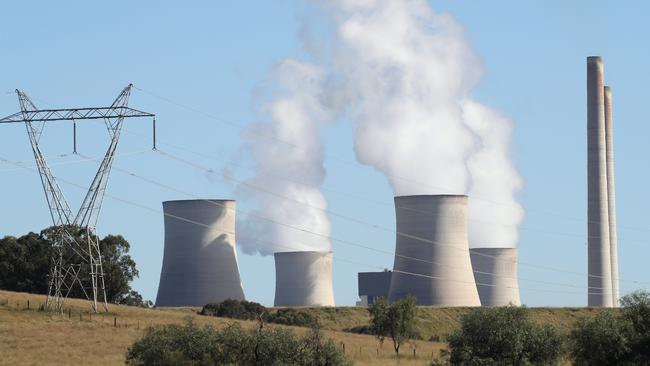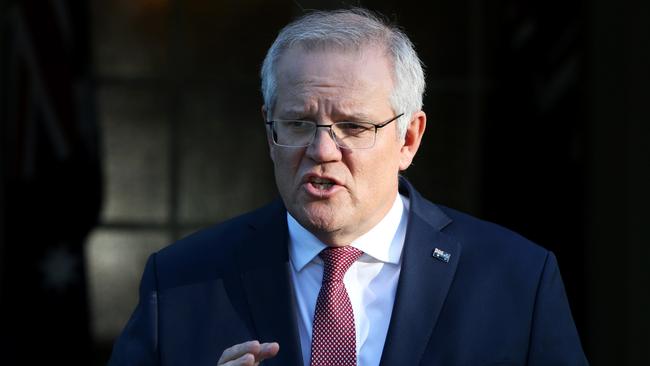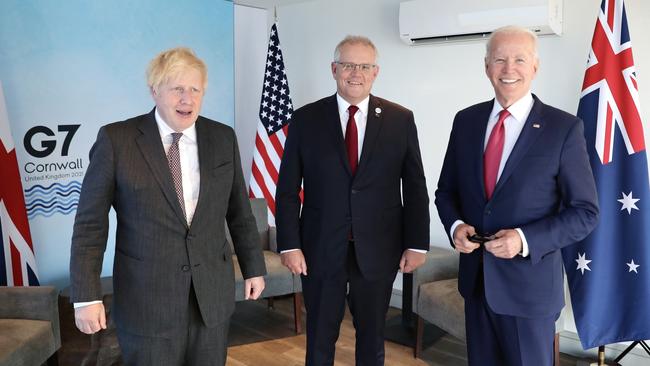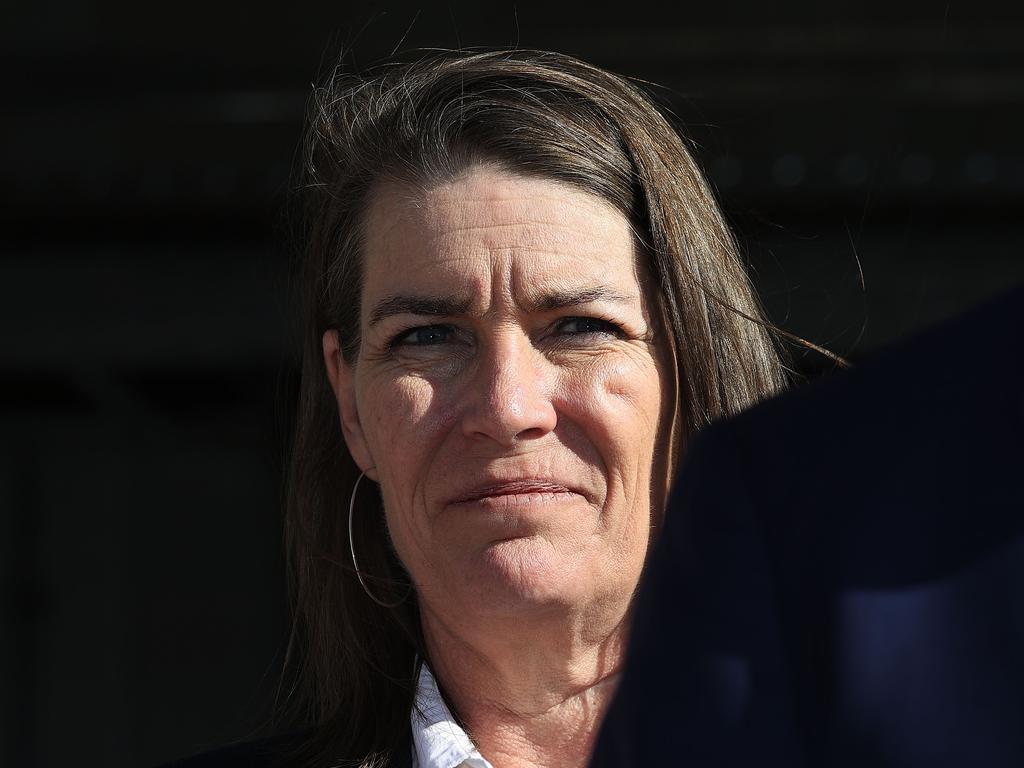
In historical terms the test is whether Scott Morrison will succumb as Prime Minister to the toxic politics of climate change in Australia or achieve the great breakthrough – decisively shift the Coalition parties on climate change while also saving the unity of his government.
Contrary to partisans on either side of the climate debate the choices are not between good and evil, not between moral and immoral. Many of the policies demanded by climate believers are dubious and unjustified.
But this begs the bigger point about Australia’s national interest. The reason Morrison must move is not primarily public opinion, or demands from energy sector investors, or moral appeals to save the planet, or even the global pressure he faces from Joe Biden and Boris Johnson – though they are all material factors. The reason Australia must move is because of the global financial power now mobilised in the climate cause.

This power is beyond the control of any government or any public. It has no democratic legitimacy. It can make and break companies and redirect the trajectory of nations. It originates in acceptance of the science, the global climate goals and financial risks to fossil fuel investment. It is buttressed by another mega-fear: that mismanagement of climate change might destabilise the global financial system.
Anybody who thinks Australia can withstand these pressures is misguided. Former Bank of England governor Mark Carney, amid his departure declarations 18 months ago, warned: “Now $120 trillion worth of balance sheets of banks and asset managers are wanting this disclosure (of investments in fossil fuels).” Carney said companies and industries not moving to zero carbon emissions “will be punished” and those that don’t adapt “will go bankrupt without question”.
Overseas pension funds, like Australia’s superannuation funds, banks and insurance companies are responding to these pressures, climate change risk and the fear of stranded assets. The world economy is undergoing massive structural change in energy markets. Carney said net zero would change the value of every asset.
The Reserve Bank has issued a series of warnings – financial institutions exposed to carbon-intensive industry face the danger that “climate change will diminish the value of their investments”. Two years ago the bank’s deputy governor, Guy Debelle, warned climate change risked “sharp adjustment in asset prices”. Australia as an open economy is hostage to global capital, banks and pension funds. Last month RBA governor Phil Lowe said institutions, including the agriculture sector, are expected to reveal their carbon footprint and global investors will assess the results.
Net zero at 2050 is becoming the global financial norm in all operations. Green power and financial power have come together in an extraordinary alliance. Morgan Stanley chief executive James Gorman said: “If we don’t have a planet we’re not going to have a very good financial system.”

The established norms by which Australia and the world have lived are being trashed; witness the EU’s push to create a carbon border tariff to penalise nations – China top of the list – that refuse to match its climate change action. When saving the planet is your justification, every norm is at risk. Might non-compliant companies be delisted? Might non-compliant nations find their government bonds downgraded? Might the Covid experience lead to permanent restrictions on freedom of people as the guaranteed method to cut emissions? The one certainty is that limiting global warming to below 2C cannot be achieved without core changes in our social and economic life.
Morrison must deal with the world that exists. That means ensuring Australia’s industry is not brought undone by financial power harnessed to green utopianism. Morrison judges the threat to Australia is not the highly dubious EU border tax but the ever mounting use of financial power.
Morrison knows Australia has no choice but to become an integral part of the global energy revolution. He says net zero is his goal “preferably” by 2050. But he needs to shift further.
This is the target date for our business lobbies, banks, state governments and most of the international community. The idea has taken hold. Yet there is a gap: what is the price paid and who pays it?

Bill Shorten refused to answer this question at the 2019 election and suffered the consequences. Morrison must answer this question as the condition for securing a firm 2050 commitment for his government before the Glasgow conference this year.
This was the point made by Nationals leader Barnaby Joyce on the ABC’s Insiders last Sunday when he said the issue was price. “That’s what we’re looking for,” Joyce said. “What’s on the menu and what the price is.” Joyce has been conducting a rhetorical dance around 2050 for the good reason that his party room is divided. It is a diabolical dilemma in the regions.
Because Australia is a fossil-fuel-intensive economy our climate politics are different from most other rich nations. In Australia there is a nexus between targets and road maps. No federal government can announce a target without a road map. And that’s a good thing. In Australia targets are highly sensitive because of the structural change they involve, the loss of jobs and damage to regions despite the boost renewables offer overall.
The test for Morrison and Joyce is how they resolve this dilemma. Perhaps the answer lies in how 2050 is defined. Nations see it in different ways. Morrison has previously said agriculture will not be hurt and the regions will not be sacrificed for any 2050 goal. Pragmatism suggests any 2050 commitment will come only with carve-outs and truckloads of financial support.
Even if achieved, there is another problem. The Glasgow conference will focus on 2030. Johnson has now promised Britain will cut emissions by 78 per cent by 2035. The moment Australia firms up on 2050 it will face more pressure to increase its 26-28 per cent reduction targets at 2030.
Energy Minister Angus Taylor told this column on Tuesday what he has been saying for the past year: “We expect to meet and beat our 2030 targets.” Australia is likely to significantly beat that target, mocked by the climate lobby for its modesty. Taylor confirmed the 2030 targets won’t change until after the next election – and this will become the focus of attack on Australia.
Australian politics, given our economic structure, will never satisfy the demands of the climate lobby. The task for Morrison is to find the balance point of tolerable compromise, a balance point that keeps shifting. In political terms, he needs to be under attack from progressives for not doing enough but he needs to have done enough to keep the financial wolves from the door.
Hear the podcast of Paul Kelly’s columns in the Podcasts section of The Australian’s app. App users can swipe to Podcasts and hit +Follow on Paul Kelly: Columns. Download the app via: Apple App Store | Google Play Store.






Conservative Australia is approaching a moment of truth. The pressure on the Morrison government to pledge net-zero carbon emissions at 2050 cannot be delayed or averted and the speed of global politics now makes this goal mainstream, not radical.